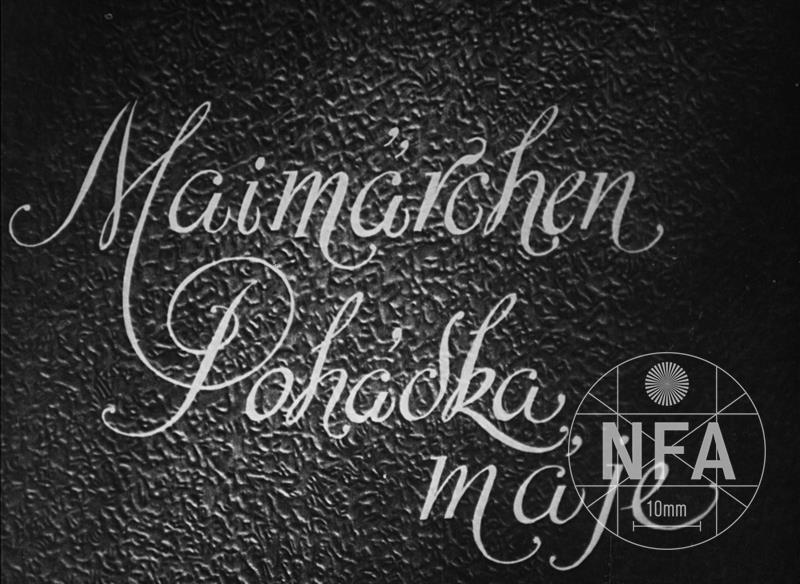May Fairy Tale
Country
CzechoslovakiaCopyright
1940Production year
1940Premiere
25 October 1940Runtime
88 minDirector
Otakar VávraCategory
filmGenre
melodramaTypology
featuretheatrical distributionlongOriginal title
Pohádka májeCzech title
Pohádka májeEnglish title
May Fairy TaleProtectorate parallel title
MaimärchenSynopsis
The year 1880. Ríša, a student of law, neglects his studies in favour of parties and pranks. His angry father refuses to continue helping him out of his debts. Ríša, however, is not entirely beyond hope. He decides to go and stay for a while with his uncle, a priest, who lives in Moravia, in order to prepare for his exams. He meets Helenka, the timid daughter of the local gamekeeper, at a village ball and is enchanted by her. She is completely unlike any other woman he has met. Their acquaintance is transformed into a great passion. The days pass and their idyllic relationship begins to tire Ríša. Out of some kind of malicious joy, he begins to tell Helenka about his former debauched life the about the broken hearts of beautiful women. Although these are figments of his imagination, Helenka is hurt and refuses to see Ríša anymore. His uncle, the priest, is incensed at his behaviour and orders his nephew out of the house. Ríša tries desperately to find Helenka so he can make it up to her. Just before his train is about to leave for Prague, Helenka forgives him.
Note
This theme had already been treated in a Czech film under the same title (1926; directed by Karel Anton).
Film online
Cast
Nataša Gollová
Helenka
Jaroslav Vojta
revírník, Helenčin otec
Leopolda Dostalová
Marta, Helenina teta
Svatopluk Beneš
student práv Ríša Gregor
Theodor Pištěk
hostinský Gregor, Ríšův otec
Marie Blažková
Ríšova matka
Jaroslav Průcha
farář, Ríšův strýc
Vlasta Fabianová
Křížová, Ríšova bytná
Miloš Nedbal
muž Křížové
Božena Šustrová
Cilka, Helenčina přítelkyně
Hermína Vojtová
Cilčina matka
Slávka Procházková
Kačka, služka na faře
Stanislava Strobachová
číšnice v hostinci U Pinkasů zvaná Kudrnáček
Václav Švec
vrchní číšník Melichárek
Miloš Šubrt
hajný Voříšek
František Kovářík
stařík bylinkář
František Hlavatý
farář
Filip Balek-Brodský
řídící
Stanislav Neumann
kostelník
Emanuel Hříbal
host na faře/soused
Bedřich Ulrych
kaplan
Martin Raus
student Pechát
Jiří Fiala
dirigent
Antonín Jirsa
hostinský
Jiří Hron
číšník v hostinci
Elsa Vetešníková
sklepnice
Josef Oliak
domovník
Alois Dvorský
soused
František Marek
host na plese
Václav Pata
host na plese
Margit Fleischhansová
tanečnice
Crew and creators
Director
Assistant Director
Based on
Vilém Mrštík (Pohádka máje – román)
Screenplay
Director of Photography
Production Designer
Set Designer
Costumes
Make-Up Artist
Film Editor
Sound Designer
Titles Designed by
Production Manager
Cooperation
Karel Hájek (fotograf), Willy Ströminger (fotograf), F. X. Mlejnek
Music
Music Composed by
Music Performed by
Orchestr F.O.K. (Music Conducted by Jiří Srnka)
Songs
Voděnka studená jako led
Singer sbor
Naše verné milovanie
Singer mužský hlas
Voda uplyne, láska pomine
Singer dívčí sbor
Kdyby byla Morava jako Slezsko
Anička, dušička, nekašli
Dolina, dolina
Vlaštovička lítá
Hory, doly, černý les
Ej lásko lásko
Ta naše lavečka
Slunečko vychází
Production info
Original Title
Pohádka máje
Czech Title
Pohádka máje
English Title
May Fairy Tale
Protectorate Parallel Title
Maimärchen
Category
film
Typology
featuretheatrical distribution
Genre
melodrama
Origin country
Czechoslovakia
Copyright
1940
Production Year
1940
Production specifications
start of filming 05/1940
end of filming 07/1940
date of censorship 24 October 1940 (kulturně-výchovný)
date of censorship 1943 (predikáty „umělecky zvlášť hodnotný film“, „lidově hodnotný film“ a „film pro Den hrdinů“)
date of censorship 16 February 1945 (predikáty „umělecky zvlášť hodnotný film“, „lidově hodnotný film“ a „film pro Den hrdinů“ /16mm verze/)
withdrawal from distribution 18 May 1945
date of censorship 07/1945 (konec povolení k promítání 31. 12. 1948)
projection approval 15 November 1957
withdrawal from distribution 1974
withdrawal from distribution 31 December 1991
Premiere
premiere 25 October 1940 /suitable for youths/ (kina Adrie /2 týdny/ a Lucerna /3 týdny/, Praha)
renewed premiere 02/1945 /suitable for youths/ (16mm verze)
renewed premiere 25 August 1945 /suitable for youths/
renewed premiere 01/1951
renewed premiere 1 May 1958 /suitable for youths/
renewed premiere 1982
Production
With support
Copyright Holders
Studio
Laboratories
Distribution
Elekta (původní 1940), ČMÚ (obnovená 1945 /16mm verze/), Státní půjčovna filmů (obnovená 1945), Rozdělovna filmů Československého státního filmu (obnovená 1951), Ústřední půjčovna filmů (obnovená 1958 a 1982)
Technical info
Duration typology
feature film
Duration in minutes
88 min
Original length in metres
2 600 meters
Distribution carrier
16mm, 35mm
Aspect ratio
1:1,37
Colour
black & white
Sound
sound
Sound system/format
Tobis – Klang
Versions
Czech
Dialogue languages
Czech
Subtitles languages
without subtitles
Opening/End credits languages
Czech, German
Awards
Vítěz
Event: Národní ceny za umění filmové
1941
Praha / Czechoslovakia
Otakar Vávra
Vítěz
Event: Stuhy časopisu Český filmový zpravodaj
1941
Praha / Czechoslovakia
Otakar Vávra
Vítěz
Event: Národní ceny za umění filmové
1941
Praha / Czechoslovakia
Nataša Gollová




